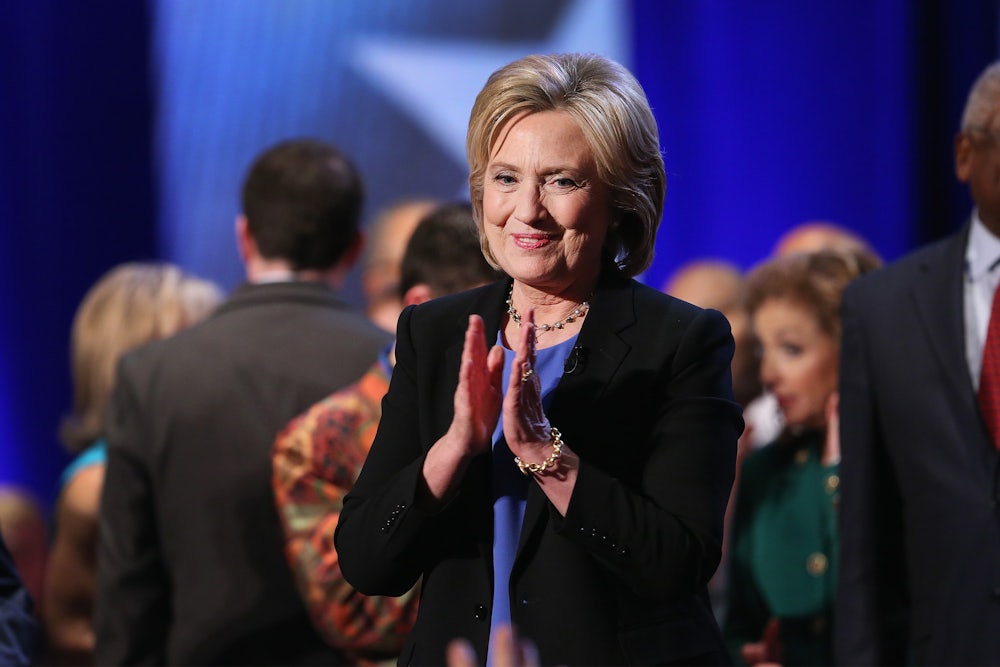One of Hillary Clinton’s fundamental problems has been her lack of a unifying, captivating message to rally voters, which has let Bernie Sanders drum up the enthusiasm in the race. That’s one reason why her attacks on Sanders’s single-payer plan fell short last week: She attacked him from the right on the plan’s cost without grappling with the idea itself—or explaining her own vision for the future. Last fall, Clinton often repeated the line, “I’m not running for Obama’s third term, I’m running for my first term,” but during Sunday’s Democratic debate, she bear-hugged Obama. Having watched her recent attacks backfire badly, Clinton’s new strategy to rally the Democratic base back is to cast Sanders as an opponent of Obama and the president’s legacy.
In an decidedly anti-establishment political environment, it has been a struggle for Clinton to define herself and her image. But in embracing Obama, she has found a message that is both a vigorous defense of the status quo and a celebration of Obama’s legacy as a reformer:
The Democratic Party and the United States worked since Harry Truman to get the Affordable Care Act passed. We finally have a path to universal health care. We have accomplished so much already. I do not to want see the Republicans repeal it, and I don’t to want see us start over again with a contentious debate. I want us to defend and build on the Affordable Care Act and improve it.
It isn’t, of course, a fully satisfying answer: Clinton side-stepped the question of whether single-payer is a good idea, by saying just that she didn’t think it was worth having a “contentious debate” over it. But at least Clinton managed to affirm a positive vision for the country.
She took a similar tack of casting Sanders’s perfect as the enemy of Obama’s good when it came to Wall Street reform, describing Dodd-Frank as “one of the most important regulatory schemes we’ve had since the 1930s.” When pressed on her close ties to Wall Street, Clinton once again used Obama as a shield, pointing out that Sanders himself had said in 2011 that it would be a good idea to primary the president. “He’s criticized President Obama for taking donations from Wall Street, and President Obama has led our country out of the great recession. Senator Sanders called him weak, disappointing,” Clinton said. Again, there was plenty she dodged, including her close ties to Wall Street donors. But it hammered home the same point: Clinton wants to hug Obama as closely as possible and cast herself as a worthy successor to his legacy. “I’m going to defend Dodd-Frank and I’m going to defend President Obama for taking on Wall Street, taking on the financial industry, and getting results,” she said.
The pro-Obama cheerleading falls squarely within the broader message of pragmatic, incremental change that Clinton has been promising since the beginning of her campaign. And it came less than a week after Obama himself acknowledged in his final State of the Union that his approach to politics had failed to bridge the partisan divide: “It’s one of the few regrets of my presidency—that the rancor and suspicion between the parties has gotten worse instead of better.” In her bid to succeed him, Clinton described an approach which assumed bitter differences rather than hope of transcending them. “Maybe you can only find a little sliver of common ground to cooperate with somebody from the other party, but who knows,” she said on Sunday. “If you’re successful there, maybe you can build even more,” Clinton said. Midway through the debate, she described how she “worked with Tom DeLay, one of the most partisan of Republicans, to reform the adoption and foster care system.”
That’s a hard message to sell in a political environment in which so many voters seem to believe that the political system is fundamentally broken. It’s essentially an argument for realism at a time when the smallest tasks seem so difficult for Washington to achieve. But at her strongest moments of the debate, Clinton turned the case for pragmatism into the case for moral action in the face of obtuse partisanship: Sure, it’s great to dream big, but it’s more responsible to do what’s in the realm of the possible when it’s urgent to act.
At the very end of the debate, Clinton brought up the lead water crisis in Flint, Michigan, lambasting the state’s Republican governor for having “acted as though he didn’t really care.” She lamented the fact that the residents suffering from the crisis were disproportionately poor and black—and pointed out she had sent her top campaign aide to figure out “what I could do to help.” Clinton made the rather dubious assertion that her own public criticisms had prompted Michigan leaders to finally take action.
But the issue finally gave the case for her leadership a sense of moral urgency that has been so sorely lacking to date. “I want to be a president who takes care of the big problems and the problems that are affecting the people of our country everyday,” she concluded, to big applause.
